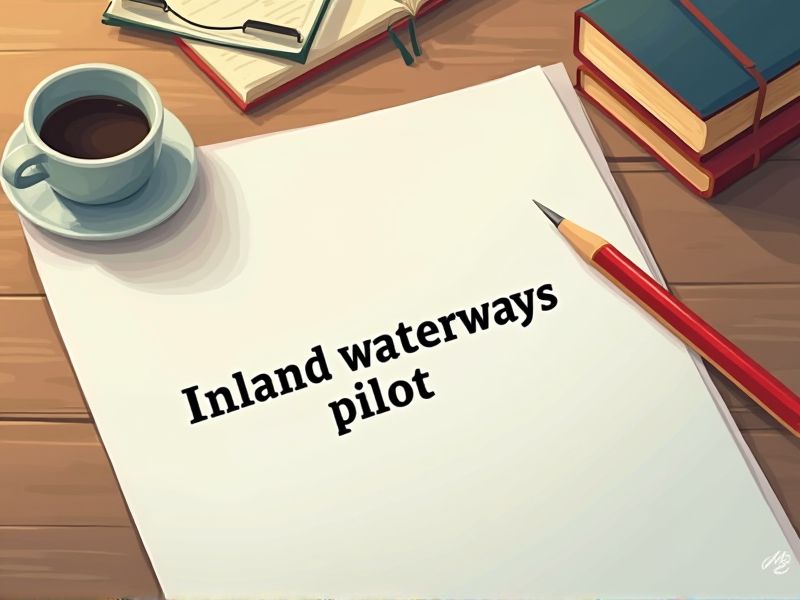
Inland waterways pilots navigate through challenging river systems, requiring a deep understanding of local environmental conditions, which makes certifications crucial for ensuring safety and precision. Weather patterns, shifting sandbanks, and evolving river currents demand pilots equipped with specialized skills that certifications validate. Regulatory compliance also ensures that pilots adhere to international and local safety standards, reducing accident risks in delicate ecosystems. These valuable competencies necessitate specific certifications for inland waterways pilots.
Inland Waterways Pilot License
The Inland Waterways Pilot License is necessary to ensure that pilots have the required knowledge and skills to safely navigate complex and variable waterway conditions. This license serves as a standardized measure of competency, mitigating risks of accidents and ensuring vessel efficiency. Licensing supports regulatory compliance and aligns with maritime safety standards, fostering trust among stakeholders. The process of obtaining the license often involves rigorous training, directly impacting operational proficiency and safety on the water.
Certificate of Competency for Inland Navigation
Pilots on inland waterways handle complex navigation and traffic, posing a safety risk without formal qualifications. The Certificate of Competency ensures they possess standardized skills and knowledge for efficient vessel operation. International regulations mandate such certification to harmonize practices and maintain navigational order. Environmental protection is enhanced by minimizing accidents that could lead to ecological harm.
Bridge Resource Management Certification
Bridge Resource Management (BRM) Certification focuses on efficient teamwork and communication, essential for mitigating human error on inland waterways. BRM training equips pilots with strategies to anticipate, recognize, and respond to potential issues, enhancing navigational safety. Inland waterways often present unique challenges such as variable water levels and narrow passages, which require comprehensive situational awareness and decision-making skills taught in BRM courses. By standardizing procedures and encouraging best practices, BRM certification contributes to reducing accidents and improving overall operational efficiency for pilots.
Advanced Radar and Electronic Navigation Certification
The Advanced Radar and Electronic Navigation Certification equips inland waterways pilots with essential skills to manage complex navigation systems, enhancing safety in congested or low-visibility areas. International regulations and industry standards often mandate this certification to ensure uniformity and competency among pilots. It enables more effective and efficient traffic management, minimizing the risks of collisions and groundings. With the increasing integration of technology in maritime navigation, certified pilots are better prepared for contemporary challenges, fostering reliable and secure inland waterway operations.
Maritime Traffic Management Training Certification
Inland waterway pilots require Maritime Traffic Management Training Certification because it equips them with essential skills to safely navigate complex and congested waterways. This certification ensures pilots understand the unique traffic patterns and regulations specific to inland waters, reducing the risk of accidents. As inland waterways become more integral to freight transport, having certified pilots maintains operational efficiency and safety. Certification also demonstrates a pilot's competency, which boosts stakeholder confidence and aids in maintaining industry standards.
Emergency Response and Crisis Management Certification
Inland waterways pilots often navigate complex routes, which increases the likelihood of unexpected emergencies. Gaining Emergency Response and Crisis Management Certification provides these pilots with essential skills to handle potential crises effectively. With appropriate training, pilots are more equipped to mitigate risks and protect both passengers and cargo. Certified pilots demonstrate a commitment to safety, thereby increasing trust among stakeholders and regulatory bodies.
Pollution Prevention and Environmental Protection Certification
Pollution Prevention and Environmental Protection Certification is essential for inland waterways pilots due to the sensitivity of aquatic ecosystems to pollutants. Obtaining this certification ensures pilots are trained to minimize contamination risks, thereby protecting biodiversity. Pilots with this certification contribute to maintaining water quality standards, which supports sustainable economic activities such as fishing and tourism. The certification also aligns with regulatory compliance, avoiding potential legal penalties for environmental damage.
Collision Avoidance and Risk Management Certification
Collision avoidance and risk management certification ensures that inland waterways pilots possess the necessary skills to prevent accidents, thereby safeguarding lives and property. The complexity of navigating confined and often unpredictable water routes demands a high level of competence, which certification helps verify. Legal requirements often mandate such certification as a standard for ensuring public and environmental safety within waterway operations. Certification also fosters a culture of continuous learning and awareness, keeping pilots updated on best practices and emerging technologies.
Dangerous Goods Handling Certification
Inland waterways pilots often encounter vessels carrying hazardous materials, which necessitates Dangerous Goods Handling Certification for ensuring safe transit. Without such certification, the risk of accidents and environmental damage increases due to improper handling of these materials. This certification equips pilots with the necessary knowledge to manage emergencies involving hazardous goods. Legal regulations require this certification to comply with international safety standards, thereby reducing liability for shipping companies.
Maritime Security Awareness Certification
Maritime Security Awareness Certification provides inland waterways pilots with essential knowledge to recognize and respond to security threats, ensuring safer navigation. This certification reduces the risks associated with terrorism and piracy, which can disrupt vital trade routes. Enhanced security awareness among pilots improves communication and coordination with security forces during potential incidents. With increasing traffic and strategic importance, inland waterways face similar security challenges as larger maritime routes, necessitating trained and certified personnel.
Summary
When you receive certifications for inland waterways piloting, you enhance your credibility and marketability as a skilled navigator. This recognition leads to increased job opportunities and potentially higher pay. Employers are more likely to trust certified pilots with challenging or valuable cargoes. Certifications can also open doors to advanced training and leadership roles within the industry.
